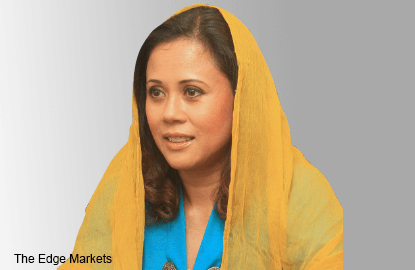
THE enforcement of the Islamic Financial Services Act by Bank Negara Malaysia in June to distinguish between deposit and investment accounts offered by Islamic banks will pave the way for the introduction of new retail products.

For instance, investors looking for returns higher than fixed deposit rates can opt for investment accounts, which allow them to go into profit-sharing arrangements with banks for loans or mortgages.
Investment accounts are currently being developed and rolled out, according to Hong Leong Islamic Bank (HLIB) managing director and CEO Raja Teh Maimunah Raja Abdul Aziz.
"The mudarabah and musyarakah products are partnerships", she says. "If these assets [of the bank] do well, investors can get higher returns than what they can get from fixed deposits."
The move by the central bank to ensure naming accuracy will mean that terms like mudarabah will no longer be used to describe Islamic deposit accounts. Up until recently, mudarabah deposit accounts were guaranteed protection by Perbadanan Insurans Deposit Malaysia (PIDM), even though they were investments in ventures that were not described by banks. Mudarabah investment accounts are not eligible for such protection as the investments carry an element of risk. Some banks have already issued notices to their customers, seeking their acceptance to the switch to the new Islamic deposit accounts, which are eligible for PIDM protection.
When considering the investment accounts, Raja Teh Maimunah says investors can evaluate the banks' track record such as their cost-to-income and non-performing loan ratios in different segments to determine if their investments will be worthwhile.
The development of the Islamic finance sector in Malaysia has enjoyed the support of the government, which has announced the RM150 million Investment Account Platform under Budget 2015. The platform, which is slated to start on Sept 1, is a shariah-compliant investment product designed to attract institutions and individuals to invest in the country's Islamic financial markets.
Another development that is in the works is the utilisation of the Islamic banking system to fund businesses using equity through the mudarabah and musyarakah concepts. This is part of the Islamic finance sector's move from its traditional credit-centric role to an investment-intermediation one.
Raja Teh Maimunah says the Islamic Financial Services Act, which came into effect in 2013, has effectively allowed the existing Islamic banking system to double as a crowdfunding ecosystem. Given the traditional concept of equity-based risk, this innovation is "truly unique", she adds.
"These are investments in businesses – in other words, it's crowdfunding. If there is a project that is not bankable from a credit-risk perspective, the bank can act as an intermediary and bring in people with money, instead of taking it on in its books," she says.
"Within the [conventional] financial system, any form of equity investment of this kind is deemed risky. The capital charge [on the part of the banks] that is required for equity financing is higher because it is deemed to be riskier. In conventional finance, they don't do risk-sharing; conventional banking employs the concept of risk transfer, so they won't even think about such an arrangement.
"It gives the Islamic banking sector a wider repertoire. We now have an option that allows us to fund enterprises instead of merely lending to them, which banks don't do."
The innovations include tax exemptions for individuals who earn profits from investing in small and medium enterprises (SMEs) for three consecutive years. What this means for investors is that they will be able to get a share of the profits of the country's up-and-coming businesses and at the same time, SMEs will not be locked out of funding opportunities, especially if they lack collateral to secure loans from banks.
Rapid Growth of Islamic banking
Islamic banking has seen rapid growth in the past few years, at a compound annual growth rate of 17% in assets globally from 2009 to 2013. The profit growth of "participation banks" – another name for banks that operate according to Islamic principles – has surpassed US$10 billion for the first time in 2013, according to Ernst & Young's "World Islamic Banking Competitiveness Report 2014-2015".
Islamic banking assets in Qatar, Indonesia, Saudi Arabia, Malaysia, the United Arab Emirates and Turkey – the "six core markets", according to the report – will reach US$1.8 trillion by 2019. Islamic banking assets make up 21.9% of assets of the domestic banking sector, and Malaysia holds 9.6% of global Islamic banking assets. Bank Negara has set a target for 40% of total banking assets in the country to be Islamic by 2020.
Raja Teh Maimunah is optimistic about the outlook of the Islamic banking sector. "We're seeing the convergence of developmental financial institutions into wholly Islamic entities," she says, citing Agro Bank's recent transformation into a full-fledged Islamic bank. Malaysia's global "poster child" for Islamic finance, sukuk or Islamic bonds have also seen increased international adoption. At the launch of the "Islamic Finance Country Report for Malaysia 2015" in June, Bank Negara deputy governor Muhammad Ibrahim noted that foreign issuances of sukuk in foreign currencies in Malaysia from 2006 to 2014 amounted to about RM28 billion.

This article first appeared in Money + Wealth, digitaledge Weekly, on Sept 7 - 13, 2015. Click here to subscribe from RM30 for the digitaledge Weekly and digitaledge Daily.